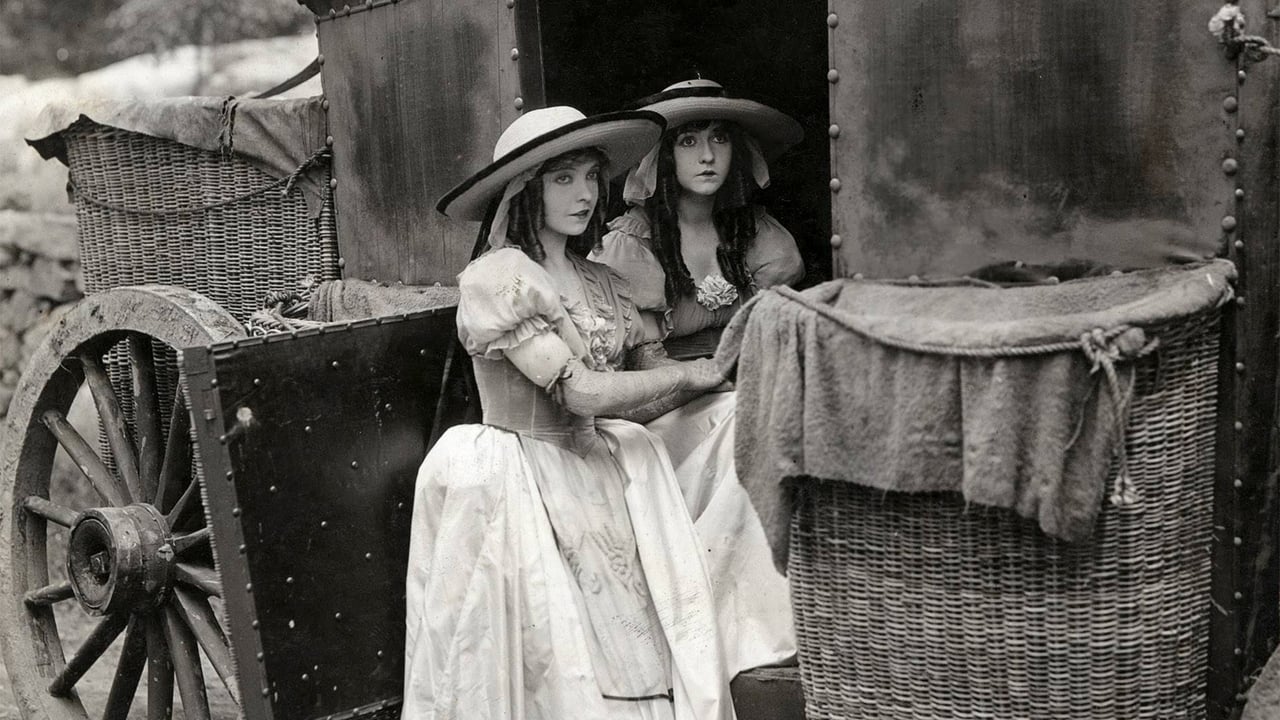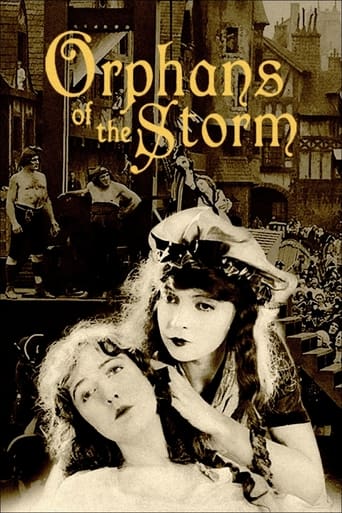

In the Eighteenth Century in France, a few years before the French Revolution, the Countess de Linieres (Katherine Emmet) asks her minion to deliver her baby daughter Louise to an orphanage to protect her. However he leaves the baby on the stairs of a church. A peasant finds Louise and brings her home to his wife and they find a necklace with her name and money in the basket. They raise Louise with their daughter Henriette as sisters, but years later there is a plague and they die and Louise becomes blind. Louise Girard (Dorothy Gish) is totally dependent on Henriette Girard (Lillian Gish) and they travel to Paris expecting to find the cure of Louise's blindness. The rogue Marquis de Praille (Morgan Wallace) sees Henriette and becomes fascinated with her virginal beauty. He asks his men to abduct Henriette and brings her to his party. Louise is left alone in Paris and the scoundrel Mother Frochard (Lucille La Verne) forces Louise to beg on the streets for her. Meanwhile the noble aristocrat Chevalier de Vaudrey (Joseph Schildkraut) saves Henriette and they fall in love with each other. But Henriette explains that she had promised Louise that she would not marry until Louise could look upon her husband to approve him. Meanwhile Danton (Monte Blue), who is saved by Henriette, and Robespierre (Sidney Herbert) are plotting the French Revolution that explodes on the streets keeping the sisters apart."Orphans of the Storm" is another magnificent epic by D. W. Griffith and his last success. The film impresses in many aspects, such as the screenplay, the set locations and fantastic camera work, with impressive angles considering the size of the cameras and the technology in the early Twentieth Century. The plot is a combination of heavy drama, romance and action and sensitive viewers will certainly need a handkerchief to see the touching scenes of the sisters set apart. The suspenseful conclusion, with Danton and his men trying to deliver the pardon of Henriette and Chevalier de Vaudrey, is suspenseful and thrilling. The lovely Lilian Gish is another attraction with a wonderful performance. Last but not the least, "Orphans of the Storm" is a mandatory film for any cinema lover. My vote is nine.Title (Brazil): "Órfãs da Tempestade" ("Orphans of the Storm")
... View MoreFrom director D.W. Griffith (The Birth of a Nation), this silent film featured near the beginning of the book 1001 Movies You Must See Before You Die, and I was looking forward to seeing what it was about. Basically stepsisters Henriette Girard (Lillian Gish) and Louise Girard (Dorothy Gish) were less alone after the loss of the parents who looked after them, Louise being abandoned by her true birth mother and found on a staircase, and the sisters have grown up as orphans. It is the time before the French Revolution, and Louise has become blind, Henriette vows to take care of her, until the possibility that somewhere in Paris there may be a cure. Marquis De Praille (Morgan Wallace) is the lusting aristocrat, who kills the child of Jacques-Forget-Not (Leslie King), and he has Henriette abducted as he is besotted with her virginal beauty. While Louise is left helpless and alone, she is kidnapped by Mother Frochard (Lucille La Verne) and forced to help make the old hag the money that she lusts for, the old woman is using her blindness and vulnerability for profit. Chevalier De Vaudrey (Joseph Schildkraut) is the honourable aristocrat who helps Henriette escape her abduction, and he kills De Praille in a duel, but together the two of them cannot seem to find her stepsister. While renting in the house of the aristocrat, she meets Danton (Monte Blue), a politician she allows to stay with her after he got away from an attack by Royalist spies, and he falls for her, which his revolutionary friend Robespierre (Sidney Herbert) isn't approving of. While Louise continues having to beg, Henriette is proposed to by De Vaudrey, which she turns down, but he promises her that her sister will be found, and when King Louis XVI (Lee Kohlmar) finds out about his choice of wife, he orders that she be arrested. While Chevalier is sent away, and before the police come for her, Henriette is visited by Cheavalier's Aunt, who remembers from Henriette's discussion of her missing sister that she is the baby that she abandoned on a staircase. At the same moment Louise is singing and begging blindly down the street near the house, with Frochard nearby, and Henriette overhears and calls from the balcony to her sister, and that is when the blind sister is dragged away, and the other is arrested. At the same time as Louise being forced to continue begging, The French Revolution starts, with cannons firing and men charging with swords, with many people dying in the battle, and prisoners, including Henriette, being freed from captivity. Henriette and Chevalier, with Louise listening, are sentenced to be executed on the guillotine by Robespierre and Forget-not, but they are saved by Danton after getting them a pardon, saying that only Louise's sister can look after her. In the end the two orphans are finally reunited, Louise is happy to have her eye sight restored and see her sister Henriette, and the France has a better Republic formed. Also starring Frank Losee as Count De Linieres, Katherine Emmet as Countess De Linieres, Sheldon Lewis as Jacques Frochard and Frank Puglia as Pierre Frochard. Having seen The Artist I was keen to see many more great silent films, and I don't know why this film isn't considered more of a masterpiece, i.e. five stars out of five, because it does really draw you in with its absorbing material and a magnificently emotional story, it is a fantastic silent period melodrama. Very good!
... View MoreThe bigwig is the patriarch of narrative. With "Those Awful Hats" 1909, "Corner in Wheat", "The Painted Lady" and many of his biographs, you can sense that this is a man who understands the lexicon of cinema (though did not pioneer it in the same sense that George Albert Smith made the close-up or how Louis Lumiere showed the first train interacting with an American audience), he is still responsible for crosscutting and this is evident in "What Shall we Do with our Old", "Birth of a Nation", "The Muskateers from Pig Alley" and onwards.Intolerance ranks as one of the most potent films ever made by a one trick pony. Many say Welles was the greatest innovator - well, he did do something of fresh sinew, but he himself also quoted Griffith's intolerance as an influence to his illustrious debut. Kubrick as well says that he was like Ikurus, when he flew too close to the sun and melted, but regardless he was ambitious at changing film from a novelty to a revered art.So enter "Orphans of the Storm" his period film (similar to that of an older french film he done "The Sealed Room"), which is in essence, topping with Amadeus and Barry Lyndon as the great period drama. And it's this because of the enlightening irrevocable effect of the films doctrines. The french revolutionists are selfish people and Maximilien Robespierre is the one that fostered it. The film chronicles the tragedy of Jean Picard's decision to allow his Daughters to live in luxury. With this judicious, yet regretful decision, Louise (Dorothy Griffith) and Henriette (Lillian Gish) are born. Later in life, Louise is blind and Henriette, her consolable sister, finds word about a cure for it. When they travel away they're separated into the darkness - Louise is lost and Henriette is taken away only to be saved by an anti-french revolutionist Chevalier De Vaudrey, who as one person in the film puts it "I wish more aristocrats were like you" and Louise then falls into the trap of Frochard, which in sequence we see one of the best dolly shots pulled away as she gets manipulated as she is used as a singer in order to get money. Where the reign takes its toll against the Bolshevism, Jacques-Forget-Not subverts the system periodically and this is so powerful because of how character driven it really is, you can empathise with these peoples struggle. However with certain scenes, such as the one where a Man sits on the back of a French Revolutionist, it seems ridiculous, to me it shows how the place has been rendered to many dolorous people. The movie is probably Griffith's least melodramatic film. Its interplay with appropriate characters, offset by a poignant time and ornate setting. The movie is mesmerising - the swordsmanship, the guillotine, the carts, the costume - it all feels authentic and Griffith really wanted to adapt the book faithfully, and that was conducive to the manifestation of a bulb that is replete with such melancholy, ambivalence and escapism.No matter what, the napoleonic scale (as with his prior films) never ceases to spellbind me. I find Griffith entertaining because he's the illusionist that creates totalitarians and characters who we strive for in their victory, and it's all in quick succession. A time well spent.
... View MoreThis film demonstrates Griffith's genius in creating a massive scale and in linking disparate plot elements. By 1921, however, some of Griffith's innovations had become mere mannerisms, particularly the cross-cutting that leads to his climax, as introduced in "Birth of a Nation" and used, with powerful effect, in "Hearts of the World." The cross-cutting at the end of "Orphans" goes on much too long. Lillian Gish must have grown old staring down into the basket. Some techniques -- a blank screen followed by a face (memory) and a narrow focus on a face (point of view), for example, are still effective. I know that over-elaboration is a staple of the silent screen, but at times, it is over-the-top here. Constrast, for example, the more subtle approach of an actor like Alice Terry. Danton did argue for moderation, once he believed that the Revolution had succeeded. His oration in this film is, like much of it, simply unbelievable. The idyllic ending also strains credulity. How did this particular group of aristocrats escape the blade and retire to a country estate?
... View More